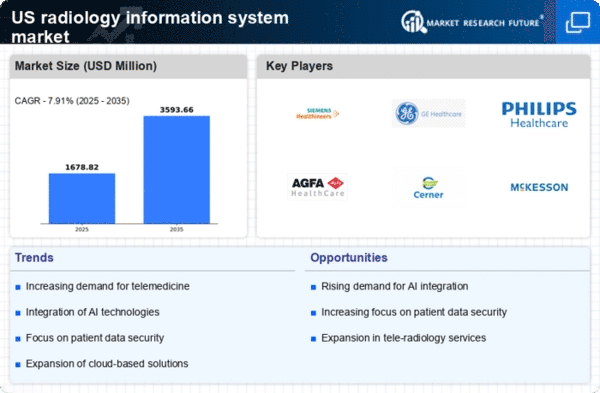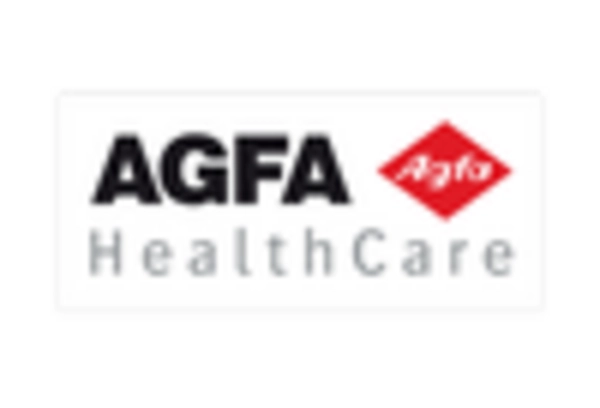Rising Demand for Telemedicine
The radiology information-system market is poised for growth due to the rising demand for telemedicine services. As healthcare providers increasingly adopt telehealth solutions, the need for efficient radiology information systems becomes paramount. These systems enable remote access to imaging data, facilitating timely consultations and diagnoses. The telemedicine market in the US is projected to reach $175 billion by 2026, reflecting a growing acceptance of remote healthcare services. Consequently, radiology information systems that support telemedicine capabilities are likely to see heightened demand, as they play a crucial role in enabling remote patient care and improving access to radiological services.
Increased Focus on Data Analytics
The radiology information-system market is benefiting from an increased focus on data analytics within healthcare. As organizations strive to improve patient outcomes and operational efficiency, the ability to analyze imaging data becomes essential. Advanced analytics can provide insights into patient trends, treatment effectiveness, and resource utilization. The market for healthcare analytics is expected to grow to $50 billion by 2027, indicating a strong interest in data-driven decision-making. Radiology information systems that incorporate robust analytics capabilities are likely to gain traction, as they empower healthcare providers to leverage data for improved clinical and operational performance.
Growing Emphasis on Patient Safety
the radiology information system market is increasingly driven by an emphasis on patient safety and quality of care. Healthcare organizations are prioritizing systems that enhance the accuracy of diagnoses and reduce the risk of errors in imaging interpretation. This focus on safety is reflected in the adoption of systems that support clinical decision-making and provide alerts for potential discrepancies. As patient safety becomes a central tenet of healthcare delivery, the demand for radiology information systems that prioritize these features is expected to rise. This trend may lead to a more competitive market landscape, as providers seek to differentiate their offerings based on safety and quality enhancements.
Regulatory Compliance and Standards
The radiology information-system market is significantly influenced by the need for compliance with regulatory standards and guidelines. In the US, healthcare organizations must adhere to regulations set forth by entities such as the Health Insurance Portability and Accountability Act (HIPAA) and the American College of Radiology (ACR). These regulations necessitate the implementation of secure and efficient information systems to protect patient data and ensure quality care. As compliance becomes increasingly stringent, healthcare providers are compelled to invest in advanced radiology information systems that meet these requirements. This trend is expected to drive market growth, as organizations prioritize systems that facilitate compliance and enhance operational efficiency.
Technological Advancements in Imaging
The radiology information-system market is experiencing a surge due to rapid technological advancements in imaging modalities. Innovations such as 3D imaging, digital radiography, and advanced MRI techniques are enhancing diagnostic accuracy and efficiency. These advancements are likely to drive the adoption of sophisticated radiology information systems, as healthcare providers seek to integrate these technologies into their workflows. the US market for imaging systems is projected to reach approximately $30 billion by 2026, indicating a robust growth trajectory. As hospitals and clinics invest in state-of-the-art imaging technologies, the demand for compatible radiology information systems will likely increase, thereby propelling market growth.
















